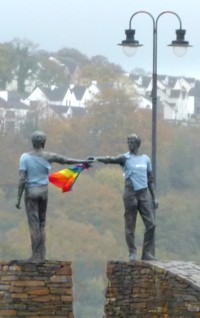Dingle
From Killarney we drove out along the Dingle Peninsular taking a circular route through the town of Dingle on the south coast and reaching the most westerly point on the mainland, Dunmore Head, in the afternoon. We then took the more mountainous route back to Killarney via Tralee.
The town of Dingle is a fishing village and pleasure port on a Dingle bay where tourists are offered whale and dolphin watching in addition to fishing. The town attracts glowing praise in tourist brochures for its rustic beauty. So it's become a destination for tour buses, with a large bus parking area. After Kinsale we were hard to impress with painted cottages and junk food. Nevertheless we'd paid for a couple of hours on the parking meter so set out to explore beyond the bay. I was surprised to see a bronze plaque on the Temperance Hall proclaiming, in English and Irish, that the Treaty of Dingle was signed here in 1529. Never heard of it! The plaque provides the amazing information that here the Earl of Desmond had agreed with an envoy of Holy Roman Emperor Charles V, King of Spain to grant Imperial citizenship to the inhabitants of most of southwest Ireland. Surely this amounted to granting at least partial sovereignty to Spain. At that time Henry VIII was still married to Catherine, Charles V's aunt, so maybe Charles got away with it - but not for long.
In the 16th century Dingle was one of Ireland's main trading ports and was used by the Spanish and French fishing fleets. Thus connections with Spain were strong, mitigating against the rapidly approaching Protestant reformation (see the history above...).
We hadn't walked a kilometre when we came upon the grand and rather beautiful Presentation Convent, referred to in the history above. The convent is not immediately obvious, set back from the street beyond St Mary's church and reached through a gate. Although it's one of the largest buildings in the area it's not mentioned in the tourist guides and we found we couldn't go inside. But its blessed with extensive pretty gardens at one point containing an interesting graveyard, almost like a war grave, with each almost identical cross showing the, acquired, names and DoD of nuns no longer with us. For us it turned out to be the most pleasant experience of the town.
Driving out of town we headed for the Head. Along the road we encountered a small village with a family cafe/pub offering food. This turned out to be authentic 20th century kitsch - complete with stressed furniture and off-colour jokes adorning the walls and the doors to the facilities (my euphemism - they put it more crudely). We liked it. The young woman of the house was welcoming and set up a table as initially we were the only customers. The food was OK too.
Again locals were speaking Irish among themselves. I later discovered that the Dingle peninsular is one of the areas in which the Irish language (a form of Gaelic) persisted in everyday use, while it almost died out elsewhere. It's from areas like this that the spoken form has been revived. Now throughout the country there are bi-lingual signs and explanations and schools teach in both languages.
As we drove we listened to the radio and at night we quite often watched TV. In both broadcast media there are programmes in Irish. On a radio talkback we learned the sad story of a lad who had never imagined any other career than being a Gard (policeman). But to the phone-in audience's distress he's failed to gain entry as his disability (dyslexia) has prevented him meeting the entrance qualifications, which include verbal and written fluency in both English and Gaelic. It made me recall The Gard, a much awarded Irish movie from 2011. Unlike that story most Garda teams we saw consisted of a man and a woman, a trend now common in Australia and even in western China.
While Dingle Town might have impressed us more had it had been our first experience of the country, we were certainly not disappointed with the landscape. The peninsular is formed by a high ridge, containing the second highest peak in Ireland, and the scenery's quite spectacular along the higher, mountain, road that we took back.
See the Ireland Album - Click Here...

